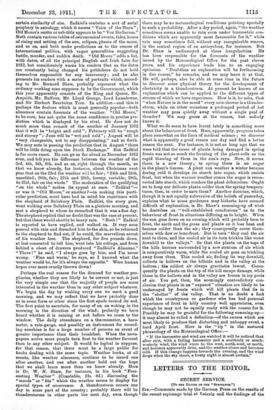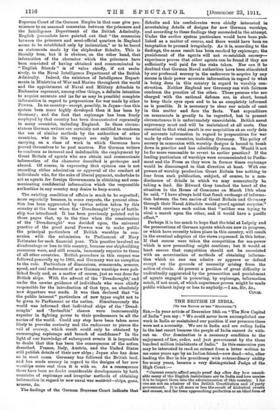LETTERS TO THE EDITOR.
SECRET SERVICE. [To TIP EDITOZ OP rus "erscravos."J Six,—Comments made by the German Press on the results of the recent espionage trial at Leipzig and the findings of the Supreme Court of the German Empire in that case give pro- minence to an assumed connexion between the prisoners and the Intelligence Department of the British Admiralty. English journalists have pointed out that "the connexion between the prisoners and semi-official quarters in England seems to be established only by insinuation," or to be based on statements made by the shipbroker Schultz. This is literally true, but it is obvious, on the other hand, that information of the character which the prisoners have been convicted of having obtained and communicated to " English friends " is of value chiefly, if not exclu- sively, to the Naval Intelligence Department of the British Admiralty. Indeed, the existence of Intelligence Depart- ments in Ministries of War and Marine throughout the world and the appointment of Naval and Military Attaches to Embassies represent, among other things, a definite intention to acquire accurate and (as far as may be possible) complete information in regard to preparations for war made by other Powers. In no country—except, possibly, in Japan—has this system been more highly developed than it has been by Germany ; and the fact that espionage has been freely employed by that country has been demonstrated repeatedly in many countries, including England. In these circum- stances German writers are certainly not entitled to condemn the use of similar methods by the authorities of other countries, who in this respect are only imitators in carrying on a class of work in which Germans have proved themselves to be past masters. For German writers to condemn as immoral and indefensible the employment by Great Britain of agents who can obtain and communicate information of the character described is grotesque and absurd. Of course, in expressing that opinion one is not recording either admiration or approval of the conduct of individuals who, for the sake of liberal payment, undertake to act as agents for foreign Governments in obtaining and com- municating confidential information which the responsible authorities in any country may desire to keep secret.
The existing condition of affairs is much to be regretted; more especially because, in some respects, the present situa- tion has been aggravated by unwise action taken by this country at the time when the Dreadnought ' type of battle- ship was introduced. It has been previously pointed out in these pages that, up to the time when the construction of the 'Dreadnought' was decided upon, the universal practice of the great naval Powers was to make public the principal particulars of British warships in con- nexion with the submission to Parliament of Navy Estimates for each financial year. This practice involved no disadvantage or loss to this country, because our shipbuilding resources were, and still remain, immensely superior to those of all other countries. British procedure in this respect was followed generally up to 1905, and Germany was no exception to the rule. Particulars of dimensions, armaments, armour, speed, and coal endurance of new German warships were pub- lished freely and, as a matter of course, just as was done for British ships. With the advent of the Dreadnought,' and under the unwise guidance of individuals who were chiefly responsible for the introduction of that type, an absolutely new departure was made. It was then declared that "in the public interest" particulars of new types ought not to be given to Parliament or the nation. Simultaneously the world was informed that individual ships of the Dread- nought' and 'Invincible' classes were immeasurably superior in fighting power to their predecessors in all the navies of the world. Could any step have been taken more likely to provoke curiosity and the endeavour to pierce the veil of secrecy, which result could only be obtained by encouraging espionage and breach of confidence? In the light of our knowledge of subsequent events it is impossible to doubt that this has been the consequence of the action described. France, Italy, Austria, and the United States still publish details of their new ships ; Japan also has done so in most cases. Germany has followed the British lead, and has made secrecy in regard to the designs of her new warships more real than it is with us. As a consequence there have been no doubt considerable developments by both countries of espionage and irregular methods of obtaining information in regard to new naval war statirief—ships, guns, armour, &o.
The findings of the German Supreme Court indicate that
Schultz and his confederates were chiefly interested in ascertaining details of designs for new German warships, and according to these findings they succeeded in the attempt. Under the earlier system particulars would have been pub- lished as a matter of course, and there would have been no temptation to proceed irregularly. As it is, according to the findings, the same result has been reached by espionage; the punishment of the agents will not re-establish secrecy— experience proves that other agents can be found if they are sufficiently well paid for the risks taken. Nor can it be doubted that German Naval authorities have been stimulated by our professed secrecy in the endeavour to acquire by any means in their power accurate information in regard to what is being done in this country in regard to warship con- struction. Neither England nor Germany can with fairness condemn the practice of the other. Those persons who are charged with the national defence are, in short, bound to keep their eyes open and to be as completely informed as is possible. It is necessary to clear our minds of cant in this matter and face the facts. Vast expenditure on armaments is greatly to be regretted, but in present circumstances it is unfortunately unavoidable. British naval supremacy must and will be maintained at all costs. One essential to that vital result is our acquisition at an early date of accurate information in regard to preparations for war made by other countries, including Germany. The policy of secrecy in ccnnexion with warship designs is bound to break down in practice and has admittedly done so. Would it not be far more reasonable to revert to earlier practice P If the leading particulars of warships were communicated to Parlia- ment and the Press as they were in former times espionage would be discouraged in that direction at least. With our powers of warship production Great Britain has nothing to fear from such publication, subject, of course, to a non- disclosure of details in which we may momentarily be taking a lead. Sir Edward Grey touched the heart of the situation in the House of Commons on March 13th when he said, "I have always held that frank exchange of informa- tion between the two navies of Great Britain and Germany through their Naval Attaches would guard against surprise." It would convince each nation that "neither was trying to steal a march upon the other, and it would have a pacific effect."
Perhaps it is too much to hope that the trial at Leipzig and the prosecutions of German agents which are now in progress, or which have recently taken place in this country, will result in the eventual adoption of the views expressed in this letter. If that course were taken the competition for sea-power which is now proceeding might continue; but it would at least ensure that competition should not be associated with an accentuation of methods of obtaining informa- tion which no one can admire or approve or defend except on the grounds of necessity arising from the action of rivals. At present a position of great difficulty is undoubtedly aggravated by the prosecution and punishment of agents engaged in procuring, by espionage, information much, if not most, of which experience proves might be made public without injury or loss to anybody.—I am, Sir, &e.,
Guts.



































 Previous page
Previous page